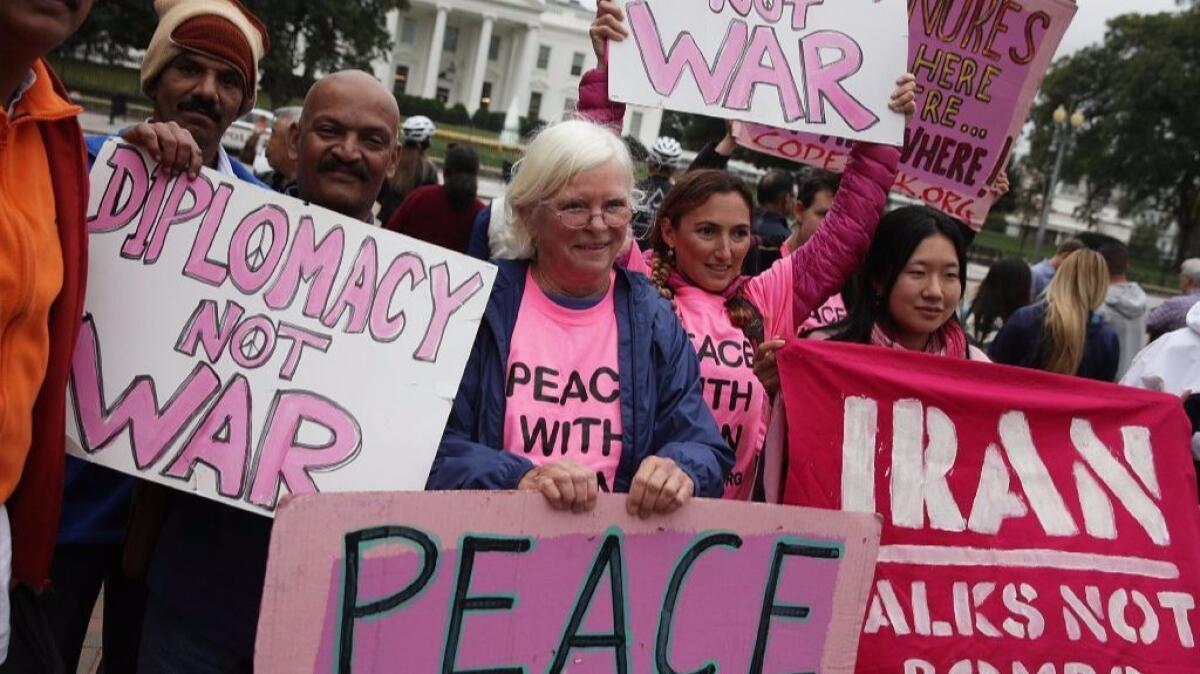Trump plans to alter Iran nuclear deal, which is likely to anger Tehran — and trouble some U.S. allies

- Share via
Reporting from Washington — President Trump on Friday will propose amending the landmark international nuclear nonproliferation agreement with Iran to toughen restrictions on Tehran and impose new sanctions on the country’s powerful military.
Despite his campaign vow to “rip up” the 2015 deal with Iran and six major powers, Trump will not void it but instead will attempt to renegotiate key aspects and set “triggers” that could further punish Iran if it engages in what the administration says is destabilizing behavior.
“Most importantly,” the White House said in a statement early Friday, “we will deny the Iranian regime all paths to a nuclear weapon.”
Critics in the United States and in foreign capitals are sure to dispute that contention. Trump’s decision is likely to anger Iran, vex allies who are signatories, complicate efforts by all parties to bring Iran back into the international fold and perhaps erode leverage that Washington might have had. The changes he seeks would go to Congress, where debate over the deal has been fierce.
» Iran rallies behind the Revolutionary Guards as Trump threatens new sanctions
European allies, especially, had been lobbying the Trump administration not to abandon the nuclear deal. The path Trump is announcing seems to be a middle ground, imposing tougher restrictions while not walking away from a complex and important deal.
Secretary of State Rex Tillerson spent much of the week on the telephone informing other signatories to the deal of Trump’s decision, getting a decidedly cool reception.
American “behavior on the Iran issue will drive us Europeans into a common position with Russia and China against the USA,” German Foreign Minister Sigmar Gabriel warned.
By law, the president must certify every 90 days that Iran is in compliance with the deal and that the agreement serves national security interests. After twice doing so, Trump indicated for weeks that this time would be different. The next deadline is Sunday.
In 2015, the Obama administration brokered the agreement with Britain, France, Germany, Russia, China and the European Union, along with Iran. In exchange for getting rid of most of its centrifuges, disabling its plutonium-producing heavy-water reactor at Arak and agreeing to regular United Nations inspections, Iran received considerable sanctions relief: readmittance to the international banking system, permission to trade on the oil market and the unfreezing of billions of dollars in overseas assets.
Trump and senior members of his administration have repeatedly said Iran’s broader behavior should be taken into consideration, not merely its agreement to halt efforts to produce nuclear weapons. That would include actions such as Iran’s work to develop ballistic missiles and its support for armed militants in Yemen, Syria and other countries — issues that were never part of the nuclear agreement.
“The previous administration’s myopic focus on Iran’s nuclear program to the exclusion of the regime’s many other malign activities allowed Iran’s influence in the region to reach a high-water mark,” the White House statement said.
Trump would not reimpose the nuclear-related sanctions for now, it added. Doing so would essentially leave the agreement in tatters.
The administration contends that its new strategy will set in stone curbs on Iran. It comes at a time when tensions with North Korea are at a fever pitch over its more advanced nuclear program.
Administration officials have said the choices were bleak in confronting a potentially nuclear-armed Iran: walking away from the deal altogether or attempting to give it more teeth. Trump is recommending the latter course, but said Congress would have to be on board.
Trump is also directing the Treasury Department to blacklist the Islamic Revolutionary Guard Corps, the elite unit of the Iranian military whose commanders hold stakes in key industries and lead Iran’s military actions in foreign lands.
According to the administration, those include the Revolutionary Guard’s support for Hezbollah, a Shiite Muslim militant organization in Lebanon that Tillerson said was bent on destroying Israel, and for the Houthi rebels waging a civil war in Yemen against a government backed by the United States and Saudi Arabia.
Trump is ordering sanctions on the Revolutionary Guard, any entities it owns and any individuals who support it. The administration accuses the group of shipping weapons and fighters around the globe and of mounting cyber attacks. The Guard is also involved in more legitimate businesses in Iran, and sanctions on it may make it difficult for other countries to do business with it.
“The reckless behavior of the Iranian regime, and the IRGC in particular, poses one of the most dangerous threats to the interests of the United States and to regional stability,” the White House said.
CIA Director Mike Pompeo, in a speech in Texas on Thursday, said the Revolutionary Guard and its allies “are the cudgels of a despotic theocracy, with the IRGC accountable only to a supreme leader. They’re the vanguard of a pernicious empire that is expanding its power and influence across the Middle East.”
The United Nations watchdog assigned to monitor Iranian compliance, the International Atomic Energy Agency, has repeatedly said Tehran is obeying the terms of the deal. The IAEA conducts regular and vigorous inspections of sites in Iran. But Tillerson and others in the administration have argued that too many sites remain off-limits, and access is often delayed long enough for the Iranians to hide what they may be doing.
For more on international affairs, follow @TracyKWilkinson on Twitter
ALSO
White House Chief of Staff John Kelly says he’s neither quitting nor getting fired
U.S. quits UNESCO, the U.N.’s educational and cultural agency. Israel immediately follows suit
More to Read
Sign up for Essential California
The most important California stories and recommendations in your inbox every morning.
You may occasionally receive promotional content from the Los Angeles Times.














